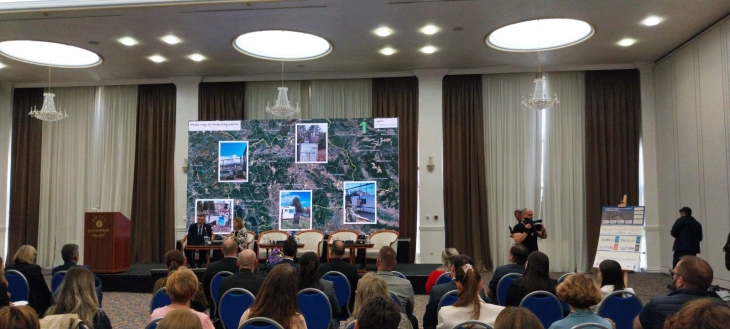Study: Wood-burning, mineral dust, traffic exhaust main reasons for local air pollution
- Burning wood, construction dust, and traffic emissions are the main air pollutants in Strumica, Struga, Kavadarci, Kumanovo, and Gostivar, according to the findings of a one-year study that monitored urban air pollution levels in the five municipalities as part of the UNDP-supported "Tackling Air Pollution" project.

Skopje, 14 October 2024 (MIA) — Burning wood, construction dust, and traffic emissions are the main air pollutants in Strumica, Struga, Kavadarci, Kumanovo, and Gostivar, according to the findings of a one-year study that monitored urban air pollution levels in the five municipalities as part of the UNDP-supported "Tackling Air Pollution" project.
The study, carried out by Gove Delchev University's Ambicon lab, also found that the sources of pollution varied by season, according to university rector Dejan Mirakovski.
"Burning firewood, burning waste, traffic fumes, and mineral dust contribute some 90 percent to total pollution," Mirakovski said.
He said burning wood accounted for 30 percent of the air pollution in Strumica, Kavadarci and Kumanovo, especially during winter. Traffic exhaust and mineral dust, he added, were the main air pollutants during summer.
He said the study should help local authorities develop air quality plans. He also said energy sources that combust fuels should be replaced with those that do not contribute to air pollution. As an example he pointed to many European cities that had banned burning all solid fuels.
First Deputy Prime Minister and Minister of Environment and Physical Planning Izet Mexhiti confirmed that the air pollution problem was serious.
"Even though the situation is bad, there are improvements every year. But this is not enough. It is harmful for citizens and risky, so we are working hard in this area," Mexhiti said.
He said the Ministry of Environment and Physical Planning should establish a sector for decarbonization, climate change, and clean air.
"According to all research, the main reason for the pollution in Skopje and cities in Macedonia is households burning anything and everything for heating.
"So we will try in the coming period to make the gasification of Macedonia one of our top priorities," Mexhiti said, adding that this should contribute to cleaner air.
UNDP Resident Representative Armen Grigoryan said the "Tackling Air Pollution" project served as an example of identifying pollution sources and taking concrete steps to solve the problem.
"We are building on the success of the previous UNDP-supported project for the Skopje neighborhood of Lisiche, where specific measures to reduce air pollution were effectively financed and implemented," he said, expressing hope that the new project would also result in actions leading to cleaner air for the residents of Strumica, Struga, Kavadarci, Kumanovo, and Gostivar.
The Ambicon lab analyzed 1,000 samples taken at all five municipalities. The results showed that the largest pollution source was biomass burning for heating, which was most often linked to winter episodes of extreme local air pollution.
In most municipalities, burning of agricultural waste also contributed to total pollution as did traffic exhaust and residual dust from building sites, especially mineral dust.
The "Tackling Air Pollution" project was implemented by UNDP North Macedonia in partnership with the Ministry of Environment and Physical Planning and the municipalities of Strumica, Struga, Kavadarci, Kumanovo, and Gostivar. The project is part of UNDP’s Program framework funded by Sweden. mr/







